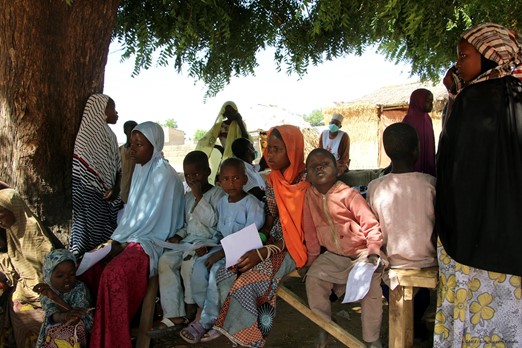How MSF Manages To Treat Children In Borno’s Unsafe Villages
The unstable security situation in Nigeria’s Northeast has forced humanitarian organisations to become innovative in meeting the medical needs of displaced communities.

The decade-old Boko Haram insurgency in Northeast Nigeria has rendered parts of Borno, especially outside the state capital of Maiduguri, unsafe for essential activities. Médecins Sans Frontières (MSF) has, however, managed to overcome this hurdle by getting critical healthcare services to children in some of these hard-to-reach areas.
The international humanitarian medical organisation explained how in a statement shared with HumAngle on Monday.
“Despite the significant security challenges in working outside the main cities in Borno state, teams from MSF have been running mobile clinics to provide basic healthcare to children under 16 in a number of locations outside Maiduguri, namely Dusuman, Musari and Ahmed Grema camp for displaced people in Shuwari,” the group stated.
“People in these locations have very limited access to medical care, as the few local clinics that exist are desperately short of essential medications; they also charge for their services, putting them out of most people’s reach.”
Dusuman is an insecure community close to Zabarmari, where scores of migrant farmers were beheaded by Boko Haram last November for giving information to the military.
One of Dusuman’s residents is Aisha, who fled her home community five years ago. MSF’s mobile clinic came to the rescue when her 12-year-old son, Yahaya, had a fever and cough.
“Yahaya has been sick for almost a week now, but I did not take him to the clinic in our community because drugs are often not available, or if they are, we have to pay for them, and most of us here cannot afford to do this,” the mother of four said.
She added: “If possible, we would like to have a permanent presence in our community, to provide us and people in the surrounding settlements with free health services.”
According to MSF, its mobile teams provided 6,881 medical consultations for children in the villages outside Maiduguri between mid-August and December 2020.
“MSF staff tested 6,463 children for malaria and treated 2,260 children for the disease, referring 18 of them to hospital. The team also treated 71 children for severe acute malnutrition and 190 children for moderate acute malnutrition,” it said.
The international non-profit did not give up on communities like Zabarmari that are inaccessible to its mobile clinics. Instead, its workers trained residents from these places to conduct rapid malaria tests and screen for malnutrition. The trainees then give medication and refer severe cases to health facilities in Maiduguri.
“As we cannot directly work in Zabarmari, we have engaged members of the community and trained them in how to perform basic tasks, like test-and-treat malaria,” noted Isa Ibrahim, who manages the mobile team. “They refer patients who require additional management to Gwange or Fori hospitals in Maiduguri.”
The activities of the mobile team have been suspended as it is no longer peak malaria season in Borno State, but MSF says this may change soon “depending on the security context and on people’s medical needs”.
Also known as Doctors Without Borders, MSF has been providing humanitarian services in Nigeria since 1996. It moved to Borno in 2014 and has since offered a broad range of services, including vaccinations, malaria treatment and prevention, surgery, maternity and antenatal care, etc.
According to the United Nations Population Fund, as of July 2020, there were three million people in Nigeria in need of urgent humanitarian assistance, including over 950,000 young people. Other estimates say up to 10.3 million people in Adamawa, Borno, and Yobe states alone need some form of aid. Over 40 per cent of the health facilities in the three states have either been damaged or destroyed as a result of the insurgency, leaving a huge gap for non-profits such as MSF.
Support Our Journalism
There are millions of ordinary people affected by conflict in Africa whose stories are missing in the mainstream media. HumAngle is determined to tell those challenging and under-reported stories, hoping that the people impacted by these conflicts will find the safety and security they deserve.
To ensure that we continue to provide public service coverage, we have a small favour to ask you. We want you to be part of our journalistic endeavour by contributing a token to us.
Your donation will further promote a robust, free, and independent media.
Donate HereStay Closer To The Stories That Matter




